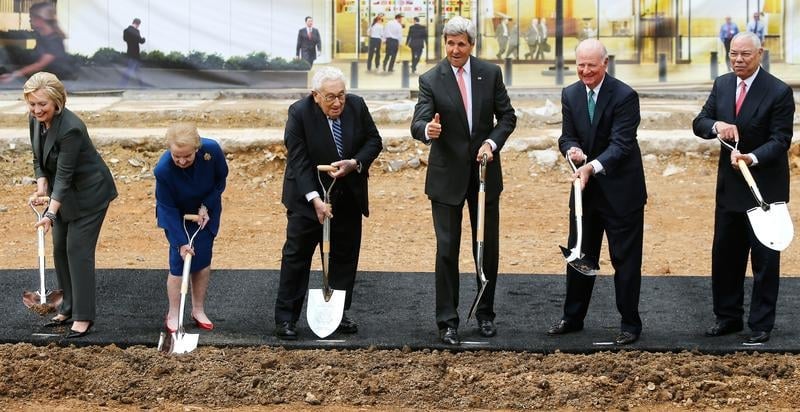
The Trump Administration’s budget proposal cuts 28% from the State Department’s funding, reducing foreign aid and de-funding a range of programs. The plan’s well-known focus on the military, and the absence of discussion of detail, or entitlements, lead many to view the so-called “skinny budget” primarily as a statement of intent.
Still, presidential expressions carry clout. In any case life will not return to what it was before the inauguration, no matter how many terms President Trump serves, or who may follow him. Disruptive as the budget plan is, State should take the opportunity to contemplate its mission, and how to fulfill it in the long run with reduced resources.
Secretary Tillerson, in a letter to the Department speaks of programs, more efficient execution, and national and economic security. These are familiar formulas for hard-power advocates and aid staffers alike. But is State’s purpose defined by programs and by security?
State is the home of the diplomatic service. This blogger gained an insight during a Foreign Service posting in Brazil in 1991. The Brazilian government ran a publicity campaign on children’s welfare, asking for assistance from foreigners, including the U.S., who had cited them for human rights abuses. I was directed to mount a “juvenile justice” program with no funds.
When I protested the assignment’s impossibility to a colleague, his encouragement was that this was a chance to practice ”pure diplomacy.” Introducing a few U.S.-based experts and Embassy staff to Brazilian agencies and NGOs, it turned out, successfully showed sympathy with Brazil’s challenges while standing by our policy. My annual review credited me with starting a program, but really what I did was carry out a U.S. answer to Brazil’s diplomatic “put up or shut up” challenge.
Diplomacy is what puts a context around military action, aid, PR programs, or even inaction, regarding issues of economic and national security—and everything else. We need to set a narrative of our motives and concerns whether we are fighting a war or doing nothing at all. The nature of the function has been obscure to professionals and public alike for decades, hence my citation for starting a program rather than executing diplomacy. If State’s budget cuts any number of programs and aid efforts, the diplomatic mission still remains vital. Furthermore the function is not expensive; if State will now have to practice more pure diplomacy, the Department should re-focus on delivering it.
Diplomacy’s basic currency is credibility, which rests on consistency of words with actions, and coherence of national policy. For it, the U.S. diplomat today needs a durable picture of our core national interest. During the Cold War, U.S. diplomats knew that the Containment Doctrine explained almost any actions of our government. Since we lost that focus, U.S. policy has reacted to crises, such as terrorism, and veered between political priorities, from trade liberalization to climate policy to energy independence to women’s rights.
Given today’s volatile politics and a swirling internet-connected world, Containment’s consistency will not be replaced any time soon. We must be able to name a core interest that can fit shifting priorities, more fundamental than partisan politics, drawn in our own terms rather than in reaction to adversaries or crises.
The post-modern world does not only disrupt American foreign policy. Any nation’s priorities are perpetually overtaken by events, discoveries, and new voices. Many are turning for guidance to traditions of ethnicity, religion, or nationalism. The U.S. does not have this option. Individual Americans carry such old markers of personal identity, but our nation was conceived on principle, invoked by our founders as they divorced their ethnic homeland.
Our founding creed, voiced in the Declaration of Independence, is the source of America’s legitimacy, the national beacon and bedrock of a U.S. diplomat’s credibility. To re-hone its diplomatic mission, State must create a body of people expert in the creed’s meaning, who are able to transmit it in policy.
Knowing the creed rigorously takes a rare understanding. It is abstract, enumerating minimal, overarching concepts. It is paradoxical, as free individuals do abuse each other, and government charged to secure rights must restrain itself—and also some individuals. Its words alone cannot guide policy in the flesh, yet their meaning has grown ever more real in our society as we have developed, strained, and fought among ourselves. It is both eternal and fragile: the words shape our view for any circumstances in any times, but we must perpetually prove both our commitment to open-ended rights and our competence to meet people’s needs.
Capturing the creed in policy and diplomacy will require a specialized skill, as distinct as military expertise. The diplomat must be aware that an abstract creed admits of multiple interpretations. They must be ready to agonize over the proper mix of prudence and ideals, and able to translate choices into policy. An extensive and intensive course of professional formation will be needed. It will have to integrate studies of praxis, social sciences, and history; deep immersion in the philosophy and nuances of our creed; grounding experiences in the realities of American life; and personal preparation for the dilemmas and stresses of applying our paradoxical creed in a complex world.
A diplomatic service formed in this light will represent us, their sovereign, by our true national nature. It will also carry our values into policy-making, via the diplomats’ role in interagency processes. As the desk for America’s founding values in our government, and as America’s face to others, they can imbue our actions with our creed.
In the diplomatic function, explicitly oriented to this core national interest, State can revive its mission and guide policy, to keep America true to our founding. If there are programs and actions to be managed, diplomacy will set them in context and support them; if resources limit those, diplomacy will express our motives. As a response to the proposed budget, this re-focus can bring benefit out of shock. The focus is needed, whatever the budget.